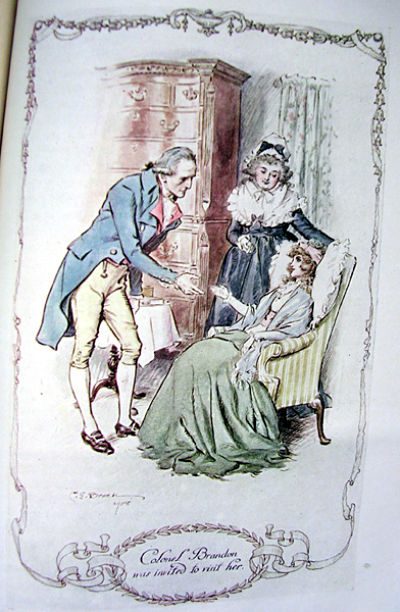 If one were to develop a clickbait test for Austen nerds, What Austen Character Should You Marry?, then teenage me would (almost) surely end up in love with Marianne Dashwood, the romantic, dramatic, frenetic character in Sense and Sensibility. Marianne adds the biggest dose of the sensibility to the text and most of the fireworks. Marianne might burnout or burn up, but nobody will ever wonder if she is alive. Of course, the downside of seeking great happiness is that you certainly will find great sorrow.
If one were to develop a clickbait test for Austen nerds, What Austen Character Should You Marry?, then teenage me would (almost) surely end up in love with Marianne Dashwood, the romantic, dramatic, frenetic character in Sense and Sensibility. Marianne adds the biggest dose of the sensibility to the text and most of the fireworks. Marianne might burnout or burn up, but nobody will ever wonder if she is alive. Of course, the downside of seeking great happiness is that you certainly will find great sorrow.
The choice to look for a grand passion is a choice and it is not an obvious one. If you want it, then you think it necessary for happiness, but it is not. Marianne had to learn this the hard way as most of us do.
The chief problem for the romantic is not what will happen if we never meet the person of our dreams, but if we do. Sadly, dreams are not reality, not even a bit.
Marianne met the man of her dreams:
Marianne began now to perceive that the desperation which had seized her at sixteen and a half, of ever seeing a man who could satisfy her ideas of perfection, had been rash and unjustifiable. Willoughby was all that her fancy had delineated in that unhappy hour and in every brighter period, as capable of attaching her; and his behaviour declared his wishes to be in that respect as earnest, as his abilities were strong.
The difficulties then began in earnest as they always do. First, those of us who are passionate, if we do not learn Christian prudence, soon find ourselves making rash judgements. We may not know the object of our love, but the inner passions, the “click” between two souls is enough for us:
“You are mistaken, Elinor,” said she warmly, “in supposing I know very little of Willoughby. I have not known him long indeed, but I am much better acquainted with him, than I am with any other creature in the world, except yourself and mama. It is not time or opportunity that is to determine intimacy;—it is disposition alone. Seven years would be insufficient to make some people acquainted with each other, and seven days are more than enough for others. I should hold myself guilty of greater impropriety in accepting a horse from my brother, than from Willoughby. Of John I know very little, though we have lived together for years; but of Willoughby my judgment has long been formed.”
Second, it is easy to confuse our tastes with enduring virtue. If it is “icky” to me, then it is bad. If I like it, then it must be good. Our feelings are no longer part of who we are, but who we are and we pretend that if they are denied then we cannot be happy. If the beloved likes my favorite group, votes for my party, goes to my church, and likes my favorite video, then she must be my dream. Again Marianne:
Marianne, who had never much toleration for any thing like impertinence, vulgarity, inferiority of parts, or even difference of taste from herself . . .
If we are not very careful, the romantic ends up with like attracted to like . . . kissing a reflection of herself or himself. Fortunately for Marianne, her “dream prince,” vanished and so she was not stuck with him as happens to so many of us. This was fortunate, because it is the overcoming of the prejudices of the romantic that were necessary to her true happiness.
A romantic feels deeply, but if not careful, chains thinking to the justification of those of feelings. We end up miserable, because we are so sure that our tastes, feelings, and desires are correct. Marianne had to pass near death to learn the best of all lessons:
Marianne Dashwood was born to an extraordinary fate. She was born to discover the falsehood of her own opinions, and to counteract, by her conduct, her most favourite maxims.
This is not easy. Many of us do not get off as lightly as Marianne, because we act on our desires. The problem is not the sensibility, but the lack of sense. Romantics like Marianne confuse sense with settling for something less and this is worse still. Nobody should ever be in the position (as was one character at the end of the book) of being the perpetual “best I could do.” We need not be less passionate, but let reason, common sense, direct that passion toward better ends.
What do I feel? This is a good question, but the second must be: Given this, what should I do?
This is very hard. God help us!
————————-
I am thankful for the discussants at The Saint Constantine School for provoking these thoughts.












